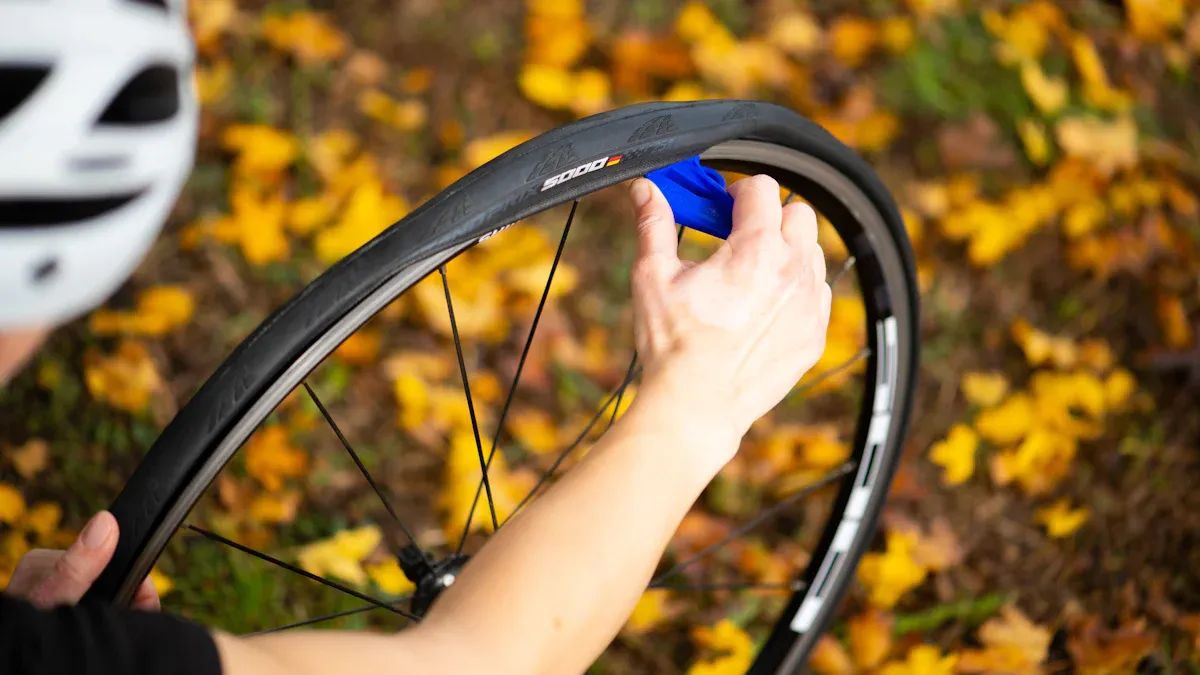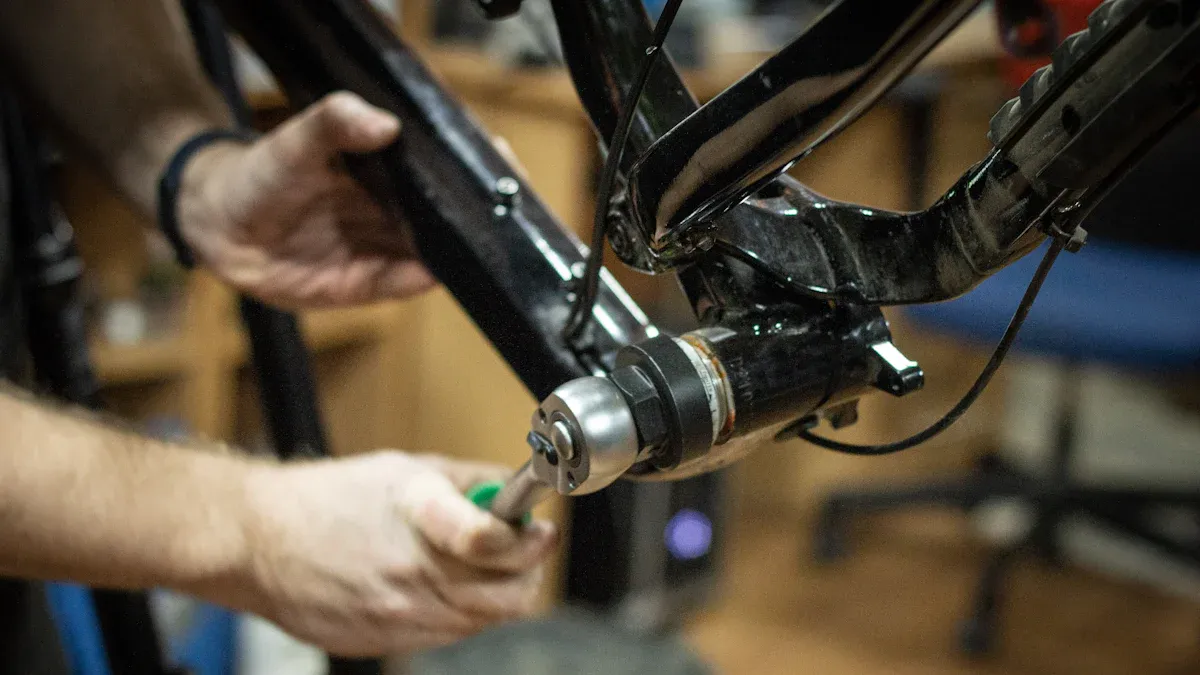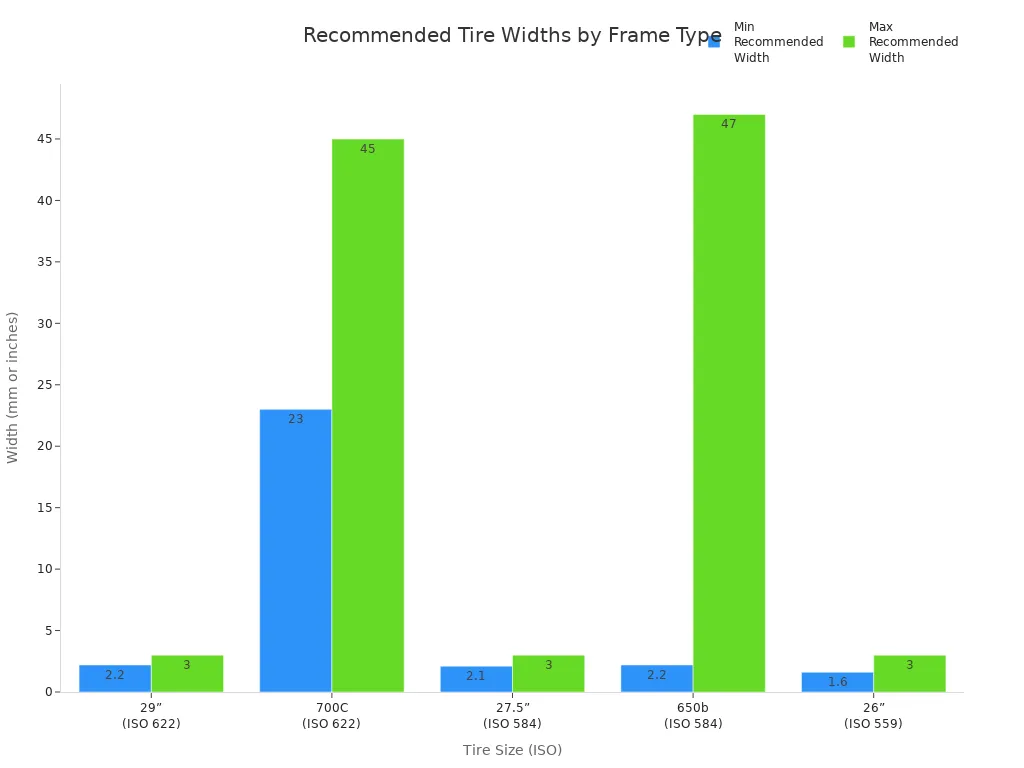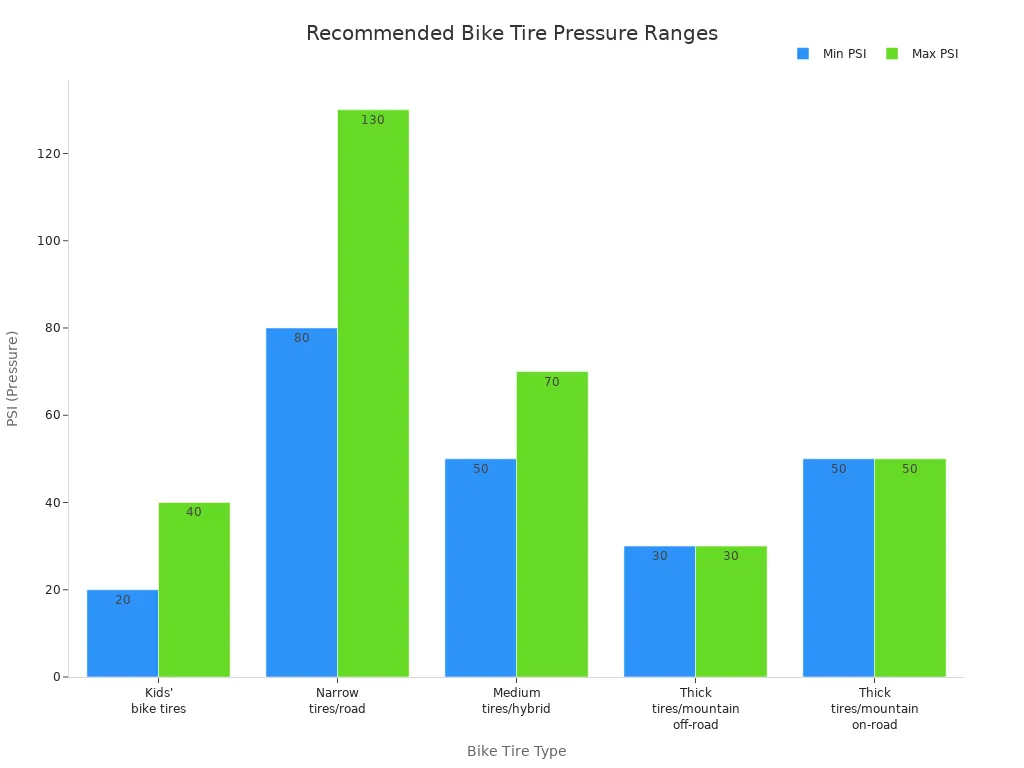
Have you ever noticed your front bike tire rubbing frame? This can happen for several reasons, like misalignment or the wrong tire size. Ignoring this issue can lead to serious problems, such as the downtube contacting the front wheel, which might cause a sudden loss of control. Fixing it promptly keeps your ride safe and smooth.
Key Takeaways
Look at your bike’s wheel alignment often. If it’s not aligned, the tire can rub. This can make your ride unsafe.
Make sure you have the right tire size for your bike. Picking the right size stops rubbing and gives you a smooth ride.
Check your bike regularly and keep the tires inflated. This helps stop rubbing problems and keeps your bike working well.
Causes of Rubbing

When your front bike tire rubs the frame, it usually comes from a few common problems. Let’s look at the main reasons: misalignment and wrong tire size.
Misalignment Issues
Misalignment can cause big problems for your bike. Here are some signs that your wheels may be misaligned:
Uneven tire wear, like wear on the outer edge.
Loose or wandering steering, which affects stability.
A vibrating steering wheel, showing uneven pressure.
Tires squealing during turns, meaning stress on tires.
Trouble handling corners, suggesting alignment issues.
Strange noises from the suspension, indicating extra strain.
If you see any of these signs, check your wheel alignment. Bike mechanics often find misalignment as a main reason for tire rubbing against the frame. Other issues, like a loose axle or broken spokes, can also cause this problem.
Incorrect Tire Size
Using the wrong tire size can also cause rubbing. Each bike frame has specific tire size suggestions. If you pick a tire that’s too wide, it may not fit right. Here’s a quick table for common bike tire sizes:
Tire Size | Width | Type |
|---|---|---|
29” | 2.2”-3” | Mountain |
700C | 23mm-45mm | Road/gravel |
27.5” | 2.1”-3” | Mountain |
650b | 2.2”-3” | Gravel/touring |
26” | 1.6”-3” | Mountain |

Choosing the right tire size is very important. If you’re not sure, check your bike’s manual or ask a local bike shop. Remember, things like road conditions can also affect how your tires work. Rough roads can increase friction, causing wear and rubbing against the frame.
By knowing these causes, you can help stop your front bike tire from rubbing against the frame. Regular checks and maintenance will keep your ride smooth and safe.
Fixing Front Bike Tire Rubbing Frame

If your front bike tire is rubbing against the frame, don’t worry! You can fix it with a few simple steps. Let’s dive into how to check wheel alignment, adjust brake pads, and tighten the axle and spokes.
Check Wheel Alignment
First, you need to check the wheel alignment. Misalignment is a common cause of front bike tire rubbing against the frame. Here’s a step-by-step guide to help you:
Locate the Deviation: Spin the wheel and use a caliper arm to find any high spots on the rim. This will help you see where the tire might be rubbing.
Isolate the Deviation: Move the rim back and forth to determine how much the high spot deviates from the center.
Correct the Deviation: Tighten the spokes on either side of the high spot. This pulls the rim toward the hub and reduces the high spot.
Check for Lateral Errors: After making radial corrections, check for any side-to-side deviations. Adjust the spokes as needed.
Repeat the Process: Continue locating, isolating, and correcting until the wheel is true.
De-Stressing: Finally, take your bike for a short ride. This allows the spokes to settle into their new positions.
Tip: Always check the dropout fit when reinstalling the wheel. Ensure it sits properly in the fork’s dropouts to avoid further rubbing.
Adjust Brake Pads
Next, let’s adjust the brake pads. Improper positioning can lead to the pads rubbing against the tire, causing the front bike tire to rub against the frame. Here’s how to do it:
Clearance Check: Open the brake release lever and check the gap between the brake pads and the tire. Use the barrel adjuster or centering screw to increase the gap if necessary.
Cable Clamping: Adjust the cable clamping so that the barrel adjuster is mostly screwed out. This allows for more slack when you remove the wheel.
Specific Systems: If you have a Campagnolo brake system, use the mechanism on the lever to release more cable. This makes it easier to install or remove wider tires.
Tighten Axle and Spokes
Finally, ensure that the axle and spokes are tight. Loose components can lead to misalignment, increasing the risk of front bike tire rubbing against the frame. Here’s what to do:
Axle Tightness: Check that the inner nut on the axle is secure. This prevents dangerous issues related to wheel alignment.
Spoke Adjustment: If the wheel isn’t true, adjust the spokes evenly. This helps maintain the wheel’s shape and prevents rubbing.
Common Mistakes: Avoid improper wheel installation and neglecting to check tire and rim compatibility. These mistakes can lead to ongoing rubbing issues.
By following these steps, you can effectively fix the front bike tire rubbing against the frame. Regular maintenance will keep your bike in top shape and ensure a smooth ride.
Preventing Future Rubbing
To keep your front bike tire from rubbing against the frame in the future, regular maintenance is key. Here are some essential tips to help you stay on top of things.
Regular Inspections
Performing regular inspections can save you from unexpected issues down the road. Here’s what you should check:
Inspect your tires for wear, cuts, or punctures.
Look for embedded debris like pebbles or glass and remove them.
Check the rim and spokes for damage or looseness.
Ensure the wheel sits properly on the hub.
You should aim to check your bike at least once a year or every 12,000 miles. If you ride in harsh conditions or aggressively, inspect more often. Align these checks with your routine maintenance schedule to catch potential problems early.
Proper Tire Inflation
Maintaining the correct tire pressure is crucial. Underinflated tires can flex too much during turns, leading to a loss of traction and causing the tires to rub against the frame. Here’s how to keep your tires properly inflated:
Check your tire pressure every 2-4 weeks.
Follow the recommended PSI for your bike type, as shown in the table below:
Bike tire type | PSI range |
|---|---|
Kids’ bike tires | 20–40 PSI |
Narrow tires / road bikes | 80–130 PSI |
Medium tires / hybrid bikes | 50–70 PSI |
Thick tires / mountain bikes | 30 PSI (off-road) |

By keeping an eye on your tire pressure and performing regular inspections, you can prevent future rubbing issues and enjoy a smoother, safer ride.
To sum up, fixing tire rubbing problems is very important for your bike’s safety and how well it works. Taking care of your bike can help parts last longer, avoid expensive repairs, and give you a smooth ride. Make sure to check your bike regularly and keep everything in good condition for the best cycling experience! 🚴♂️
FAQ
What should I do if my tire keeps rubbing after adjustments?
If your tire still rubs, check for proper tire size and ensure the wheel is correctly seated in the fork.
How often should I inspect my bike for rubbing issues?
Inspect your bike at least once a year or every 12,000 miles, especially if you ride in harsh conditions.
Can I fix tire rubbing myself, or should I see a mechanic?
You can fix minor rubbing issues yourself. However, consult a mechanic for complex problems or if you’re unsure.
See Also
Easy Methods to Safeguard Your Bicycle Frame
Proven Techniques for Eliminating Rust from Bike Frames
Tips for Caring and Maintaining Your Steel Bicycle Frame
Advice for Assembling a Dirt Bike Frame Kit Smoothly
Crucial Tips for Protecting Your Bike Frame Every Cyclist Needs
